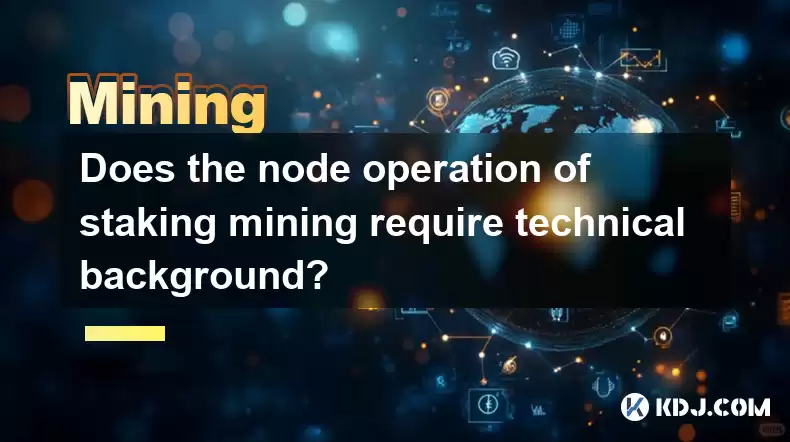-
 bitcoin
bitcoin $87959.907984 USD
1.34% -
 ethereum
ethereum $2920.497338 USD
3.04% -
 tether
tether $0.999775 USD
0.00% -
 xrp
xrp $2.237324 USD
8.12% -
 bnb
bnb $860.243768 USD
0.90% -
 solana
solana $138.089498 USD
5.43% -
 usd-coin
usd-coin $0.999807 USD
0.01% -
 tron
tron $0.272801 USD
-1.53% -
 dogecoin
dogecoin $0.150904 USD
2.96% -
 cardano
cardano $0.421635 USD
1.97% -
 hyperliquid
hyperliquid $32.152445 USD
2.23% -
 bitcoin-cash
bitcoin-cash $533.301069 USD
-1.94% -
 chainlink
chainlink $12.953417 USD
2.68% -
 unus-sed-leo
unus-sed-leo $9.535951 USD
0.73% -
 zcash
zcash $521.483386 USD
-2.87%
Does the node operation of staking mining require technical background?
Staking node operation's technical demands vary greatly; simplified methods via exchanges require minimal expertise, while running a full node necessitates advanced technical skills and robust security measures.
Mar 10, 2025 at 08:21 pm

- Node operation in staking mining requires varying levels of technical expertise depending on the chosen method and the specific cryptocurrency.
- Simplified staking methods via exchanges or staking-as-a-service platforms require minimal technical knowledge.
- Running a full node independently demands significant technical skills and understanding of blockchain technology.
- Security considerations are paramount, regardless of the chosen staking method.
- The level of technical expertise needed directly impacts the potential rewards and risks involved.
The question of whether operating a node for staking requires a technical background is complex. The answer isn't a simple yes or no, but rather depends on the specifics of your chosen approach. Staking, a process of locking up cryptocurrency to validate transactions and secure a blockchain, offers passive income potential. However, the technical demands vary significantly based on your participation method.
One common method is using a centralized exchange or a staking-as-a-service provider. These platforms abstract away the technical complexities. You simply deposit your cryptocurrency, and the platform handles the node operation on your behalf. This approach requires minimal to no technical knowledge; you primarily need to understand the risks and rewards associated with delegating your stake.
In contrast, running your own full node demands significant technical proficiency. This involves downloading and running the blockchain software, managing network connections, and ensuring the node's continuous uptime and security. This requires a strong understanding of networking, operating systems, command-line interfaces, and potentially even server administration. Furthermore, you'll need to grasp the underlying consensus mechanism of the chosen cryptocurrency. This is a considerably more involved process than simply delegating your stake.
Technical Requirements for Different Staking Methods:Let's delve deeper into the technical prerequisites for various staking methods.
- Staking via Exchanges: This requires the least technical knowledge. You need a basic understanding of cryptocurrency wallets and exchange interfaces. However, you relinquish control over your private keys, introducing a security risk.
- Staking-as-a-Service Providers: Similar to exchanges, these services handle the technical aspects. You typically need to create an account and deposit your cryptocurrency. The technical expertise needed is minimal, but choosing a reputable provider is crucial.
- Running a Full Node (Solo Staking): This requires substantial technical expertise. You'll need to understand networking, blockchain technology, server administration, security best practices, and the specific cryptocurrency's software. You will need to manage the hardware and software aspects yourself. This also requires a strong understanding of command-line interfaces.
- Validator Node Operation: Operating a validator node often requires advanced technical skills and significant hardware resources. These nodes play a crucial role in validating transactions and producing new blocks, and thus demand significant technical knowledge and uptime.
Regardless of your chosen staking method, security is paramount. If you're using an exchange or staking-as-a-service provider, thoroughly research their reputation and security measures. If you're running a full node, you must implement robust security practices to protect your private keys and node from attacks. This includes strong passwords, regular software updates, and firewall configurations. Ignoring security can lead to significant financial losses.
Hardware and Software Requirements:The hardware and software requirements vary significantly depending on your chosen staking method. For simple staking through exchanges or services, a standard computer is sufficient. However, running a full node may require substantial hardware resources, especially for blockchains with large datasets. This might include a dedicated server with ample RAM, storage, and bandwidth. The software requirements depend on the specific cryptocurrency and its node software.
Understanding Blockchain Technology:A fundamental understanding of blockchain technology is beneficial, irrespective of your staking method. This includes familiarity with concepts like consensus mechanisms (Proof-of-Stake, delegated Proof-of-Stake, etc.), transaction validation, and block production. While you don't need to be a blockchain developer, grasping the underlying principles helps you make informed decisions and assess risks effectively.
Potential Rewards and Risks:The potential rewards of staking are directly related to the amount staked and the network's inflation rate. However, the risks also vary depending on the method chosen. Using exchanges or staking-as-a-service providers carries the risk of counterparty risk. Running your own node introduces technical risks, such as downtime, security breaches, and hardware failures.
Common Questions and Answers:Q: Can I stake without any technical knowledge?A: Yes, you can stake through exchanges or staking-as-a-service providers, which require minimal technical skills. However, you delegate control of your assets and are reliant on the third party.
Q: What are the risks of running a full node?A: Risks include hardware failure, security breaches, downtime, and the complexity of managing the node. A thorough understanding of security best practices is crucial.
Q: What hardware do I need to run a full node?A: The requirements vary drastically depending on the cryptocurrency. Some may require modest hardware, while others necessitate powerful servers with significant RAM, storage, and bandwidth.
Q: Is running a full node always more profitable than delegating?A: Not necessarily. While you may earn a larger share of rewards running a full node, the associated costs and technical complexity need to be factored in. Delegating might offer a more passive income stream with lower risk.
Q: What are the benefits of running a full node?A: Benefits include increased control over your assets, potentially higher rewards, and contributing to the decentralization of the network. You're also directly supporting the blockchain's security and stability.
Disclaimer:info@kdj.com
The information provided is not trading advice. kdj.com does not assume any responsibility for any investments made based on the information provided in this article. Cryptocurrencies are highly volatile and it is highly recommended that you invest with caution after thorough research!
If you believe that the content used on this website infringes your copyright, please contact us immediately (info@kdj.com) and we will delete it promptly.
- Wintermute CEO Dismisses Crypto Collapse Rumors Amidst Market Volatility
- 2026-02-09 01:45:01
- Trump's Crypto Tango: White House Talks Ignite BTC & PKR Markets
- 2026-02-09 01:40:01
- Ethereum's Volatility: Navigating Longs Amidst WAGMI Hopes and Technical Upgrades
- 2026-02-09 01:35:02
- Web3, RWA, and the Regulatory Reckoning: Charting a Course for Compliant Innovation
- 2026-02-09 01:30:01
- Super Bowl Coin Toss: Decoding the Flip, Betting Tips, and a Historic Twist for the Big Game
- 2026-02-09 01:25:01
- Heads Up, New York! Super Bowl 2026 Coin Toss, Free Bets, and the Unpredictable Flip of Fate
- 2026-02-09 01:20:02
Related knowledge

How to mine crypto sustainably in 2026?
Feb 07,2026 at 04:20pm
Energy Source Optimization1. Miners increasingly deploy solar arrays directly on warehouse rooftops to power ASIC rigs during daylight hours. 2. Geoth...

How to mine Conflux on a standard gaming laptop?
Feb 07,2026 at 04:19am
Hardware Requirements for Conflux Mining1. Conflux uses a proof-of-work consensus mechanism called Tree-Graph, which is designed to be ASIC-resistant ...

How to buy hashing power on cloud mining platforms?
Feb 08,2026 at 05:59pm
Understanding Cloud Mining Contracts1. Cloud mining platforms offer users the ability to rent hashing power without owning or maintaining physical har...

How to mine Flux with a 30-series Nvidia GPU?
Feb 07,2026 at 02:40pm
Market Volatility Patterns1. Bitcoin price movements often exhibit sharp intraday swings exceeding 5% during low-liquidity windows, particularly betwe...

How to pay taxes on crypto mining income in 2026?
Feb 07,2026 at 01:20am
Tax Classification of Mining Rewards1. Cryptocurrency received as mining rewards is treated as ordinary income by most major tax jurisdictions includi...

How to find the lowest fee mining pools for BTC?
Feb 07,2026 at 01:00pm
Fee Structure Transparency1. Most reputable BTC mining pools publish their fee schedules directly on their official websites, often under sections lab...

How to mine crypto sustainably in 2026?
Feb 07,2026 at 04:20pm
Energy Source Optimization1. Miners increasingly deploy solar arrays directly on warehouse rooftops to power ASIC rigs during daylight hours. 2. Geoth...

How to mine Conflux on a standard gaming laptop?
Feb 07,2026 at 04:19am
Hardware Requirements for Conflux Mining1. Conflux uses a proof-of-work consensus mechanism called Tree-Graph, which is designed to be ASIC-resistant ...

How to buy hashing power on cloud mining platforms?
Feb 08,2026 at 05:59pm
Understanding Cloud Mining Contracts1. Cloud mining platforms offer users the ability to rent hashing power without owning or maintaining physical har...

How to mine Flux with a 30-series Nvidia GPU?
Feb 07,2026 at 02:40pm
Market Volatility Patterns1. Bitcoin price movements often exhibit sharp intraday swings exceeding 5% during low-liquidity windows, particularly betwe...

How to pay taxes on crypto mining income in 2026?
Feb 07,2026 at 01:20am
Tax Classification of Mining Rewards1. Cryptocurrency received as mining rewards is treated as ordinary income by most major tax jurisdictions includi...

How to find the lowest fee mining pools for BTC?
Feb 07,2026 at 01:00pm
Fee Structure Transparency1. Most reputable BTC mining pools publish their fee schedules directly on their official websites, often under sections lab...
See all articles





















![Is This a REAL Reversal or Fake out?? I wouldn't Get Excited Just Yet... [20 Min emergency stream] Is This a REAL Reversal or Fake out?? I wouldn't Get Excited Just Yet... [20 Min emergency stream]](/uploads/2026/02/08/cryptocurrencies-news/videos/origin_698897450a654_image_500_375.webp)


![Mesocosmos (By Biskotos) [All Coins] | Geometry Dash Mesocosmos (By Biskotos) [All Coins] | Geometry Dash](/uploads/2026/02/08/cryptocurrencies-news/videos/origin_69889be2eac64_image_500_375.webp)

















































